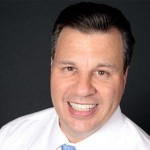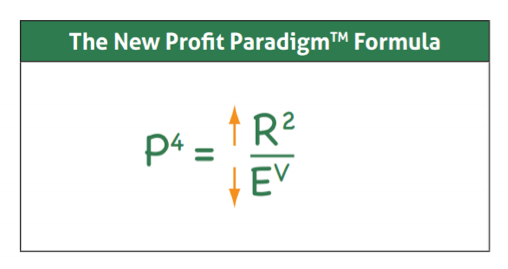
Anthony Robbins says,
“If you always do what you have always done, you will always get what you have always gotten.”
This statement holds true in business and in life, so why not consider a shift in the way you approach profit in your business? At Business Finishing School (“BFS”), we have introduced The New Profit ParadigmTM (“NPP”) formula. NPP is one of the 12 Foundational Principles of Business that is introduced to you in the video module in Year 1 of the program. NPP allows you to increase the financial profits of your business, while also giving you a simple formula to follow day-by-day.
Most companies perceive that financial profit is the sole aim of the business enterprise. However, we believe that financial profit is ONE of several aims that any business should endeavor to pursue.
For starters, NPP replaces the old mentality of first spending money in your business, and then waiting for revenue and potential profit to come later. It focuses you (the business owner or manager) on your four Ps (Profit, People, Planet, and Purpose) which are represented by the left side of the equation above; and increasing recurring revenue, lowering fixed expenses, and creating variable expenses, which are the right side of the formula. The principle goal of this article is to get you to look at your business from a new perspective.
Print a copy of this formula and post it on your office wall. It will serve as an objective reminder of NPP, which can help you as you make business decisions throughout your day. The “P4” in the formula above represents a focus on the dollars of Profit (the 1st of the four “Ps” in the formula) that your business generates, as well as the People (the 2nd of the four “Ps”) who make your business successful. Next is the Planet (the 3rd of the four “Ps”), which is the environment or community that your business operates in (and which you support through charitable donations and actions); and finally your business Purpose (the 4th of the four “Ps”), which is the overriding reason that your business exists.
One of the aims of Business Finishing School is to help you become a better business person. We believe that successful business people run successful companies, which ultimately create profit for their shareholders, and which means more profit for you, your family, your employees, and your investors. We believe that one of the purest forms of self-expression is being a successful owner of a profitable business. Many people are not comfortable with the idea of profit. The more profitable your business is, the more people you can help. The bigger your business becomes, the more people you can help.
 While profits and prices typically drive revenue, surrounding yourself with great People also drives consistent profit over time. Employees, vendors, and customers have a vested interest in the success of your business. Find vendors that are pleasant to work with and provide quality work instead of the lowest rates. Reserve the right to say No to customers who create more difficulty then what you gain from their patronage. Ensure that employees are aligned with the purpose of your company. By having aligned people all around you, you greatly increase the probability of higher profits in the business.
While profits and prices typically drive revenue, surrounding yourself with great People also drives consistent profit over time. Employees, vendors, and customers have a vested interest in the success of your business. Find vendors that are pleasant to work with and provide quality work instead of the lowest rates. Reserve the right to say No to customers who create more difficulty then what you gain from their patronage. Ensure that employees are aligned with the purpose of your company. By having aligned people all around you, you greatly increase the probability of higher profits in the business.
On the right side of the NPP formula, you’ll notice two arrows. One arrow is next to the “R” and is a pointed UP to remind you to ALWAYS make decisions that will increase Revenue in your business. But not just any type of revenue…we want you to focus on creating Recurring Revenue, which is represented by the R2. Virtually any business has the ability to create recurring revenue through long-term service agreements, subscriptions, insurance, and software. It’s best to have at least 80% of your revenue in the form of recurring revenue.
The bottom arrow is pointed DOWN to remind you to make decisions on the Expense side of your business that will LOWER expenses at all times. You also want to make as many expenses as possible into Variable Expenses, which is what the elevated “V” represents.
Many businesses sign long-term leases and have commitments that are not variable. They are fixed expenses. Fixed expenses can weigh down profits. Variable expenses are things like commissions on sales, which are ONLY paid once a sale comes in; so these are not fixed expenses. Fixed expenses can hurt a business, so please try to convert as many expenses as possible to variable.
If you’re just starting out, find someone who will allow you to use their existing space and resources month to month until you are ready to branch out, so you don’t have to sign a long-term lease. If you’re a more established business, negotiate with those who affect your expenses to make them match what goes on in a given month rather than a consistent fee regardless of whether you use their services.
Outsourcing is a great option when it comes to varying expenses. Think of the expenditures that change throughout the year. Is there a company that can do that for you based on how much you need them from one month, or quarter, to the next? If you have a busy season, is there someone you can hire temporarily when business picks up?
Professional fees, like attorneys or accountants, are another area where expenses can be varied; instead of a monthly retainer, agree to only pay professional fees for these kinds of services when you use them.
Changing your mindset on how profit, revenue and expenses relate to each other is more extensive than what is sketched here. Hopefully, this will give you a launch pad for implementing variations in your current business structure. Just remember this one thing:
Short-term pain leads to long-term gain, while short-term gain inevitably leads to long-term pain.
For more information on the information outlined here or Business Finishing School, please contact our team at info@businessfinishingschool.com.
 Rick Sapio has been involved in more than 100 companies, as either a founder, investor, owner, or operator, over the past 30 years. Rick has realized that by using a principle-centered business approach, one can radically increase the success of virtually any business. For the past 22 years, he has been CEO of a financial services/healthcare holding company. Go to www.BusinessFinishingSchool.com to learn more about his 12 Foundational Principles of Business.
Rick Sapio has been involved in more than 100 companies, as either a founder, investor, owner, or operator, over the past 30 years. Rick has realized that by using a principle-centered business approach, one can radically increase the success of virtually any business. For the past 22 years, he has been CEO of a financial services/healthcare holding company. Go to www.BusinessFinishingSchool.com to learn more about his 12 Foundational Principles of Business.










